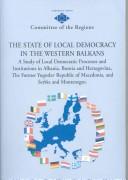| Listing 1 - 5 of 5 |
Sort by
|
Book
ISBN: 1451864728 1462300359 145190925X 9786613821812 1452705747 1282474286 Year: 2006 Publisher: Washington, D.C. : International Monetary Fund,
Abstract | Keywords | Export | Availability | Bookmark
 Loading...
Loading...Choose an application
- Reference Manager
- EndNote
- RefWorks (Direct export to RefWorks)
The purpose of this paper is to empirically determine the causes of worldwide diversity of inflation volatility. We show that higher degrees of political instability, ideological polarization, and political fragmentation are associated with higher inflation volatility.
Electronic books. -- local. --- Inflation (Finance) -- Econometric models. --- Political stability -- Econometric models. --- Finance --- Business & Economics --- Money --- Inflation (Finance) --- Political stability --- Econometric models. --- Destabilization (Political science) --- Political instability --- Stability, Political --- Consensus (Social sciences) --- Legitimacy of governments --- Inflation --- Macroeconomics --- Agribusiness --- Price Level --- Deflation --- Energy: Demand and Supply --- Prices --- Agriculture: General --- Agricultural economics --- Oil prices --- Agricultural sector --- Agricultural industries

ISBN: 1929223625 9781929223626 Year: 2006 Publisher: Washington (D.C.) United States Institute of Peace Press
Abstract | Keywords | Export | Availability | Bookmark
 Loading...
Loading...Choose an application
- Reference Manager
- EndNote
- RefWorks (Direct export to RefWorks)
Peaceful settlement of international disputes --- Internal politics --- Sub-Saharan Africa --- Mediation, International --- Political stability --- Médiation internationale --- Stabilité politique --- Case studies. --- History --- Cas, Etudes de --- Histoire --- Africa --- Afrique --- Politics and government --- Politique et gouvernement --- 856.3 Conflictbemiddeling --- 881 Afrika --- Destabilization (Political science) --- Political instability --- Stability, Political --- Consensus (Social sciences) --- Legitimacy of governments --- Conciliation, International --- International conciliation --- International mediation --- Mediation --- Arbitration (International law) --- Law and legislation --- Médiation internationale --- Stabilité politique --- 856.3 Conflictbemiddeling/Onderhandelingstechnieken

ISBN: 9289503912 9789289503914 Year: 2006 Publisher: Luxembourg Office for official publications of the European communities
Abstract | Keywords | Export | Availability | Bookmark
 Loading...
Loading...Choose an application
- Reference Manager
- EndNote
- RefWorks (Direct export to RefWorks)
Political systems --- Balkan Peninsula --- Political stability --- Democratization --- Stabilité politique --- Démocratisation --- Balkans --- Politics and government --- Politique et gouvernement --- 420 Lokale overheden. Algemeen --- Balkan --- -Democratization --- -320.9496 --- Democratic consolidation --- Democratic transition --- Political science --- New democracies --- Destabilization (Political science) --- Political instability --- Stability, Political --- Consensus (Social sciences) --- Legitimacy of governments --- -Balkan States --- Europe, Southeastern --- Southeastern Europe --- -Politics and government --- -420 Lokale overheden. Algemeen --- -Political systems --- -Political stability --- Stabilité politique --- Démocratisation --- 320.9496
Book
Year: 2006 Publisher: Washington, D.C., The World Bank,
Abstract | Keywords | Export | Availability | Bookmark
 Loading...
Loading...Choose an application
- Reference Manager
- EndNote
- RefWorks (Direct export to RefWorks)
This paper addresses the issue of the low level of private investment in the Middle East and North Africa (MENA) region, with special emphasis on the role of governance. Based on the existing literature, the authors categorize what types of governance institutions are more detrimental to entrepreneurial investments. They then estimate a simultaneous model of private investment and governance quality where economic policies concurrently explain both variables. The empirical results show that governance plays a significant role in private investment decisions. This result is particularly true in the case of "administrative quality" in the form of control of corruption, bureaucratic quality, investment-friendly profile of administration, and law and order, as well as for "political stability." Evidence in favor of "public accountability" seems, however, less robust. The estimations also stress that structural reforms-such as financial development and trade openness-and human development affect private investment decisions directly, and/or through their positive impact on governance. These findings bring new empirical evidence on the subject of private investment in the developing world and in MENA countries in particular.
Accountability --- Bureaucratic Quality --- Civil Liberties --- Corruption --- Debt Markets --- Democratic Institutions --- Economic Activity --- Economic Policies --- Economic Theory and Research --- Emerging Markets --- Finance and Financial Sector Development --- Financial Development --- Financial Literacy --- Governance --- Governance Indicators --- Governance Institutions --- Governance Quality --- Human Development --- Investment and Investment Climate --- Investment Climate --- Labor Policies --- Macroeconomics and Economic Growth --- National Governance --- Non Bank Financial Institutions --- Participation --- Political Economy --- Political Instability --- Political Rights --- Political Stability --- Private Sector Development --- Property Rights --- Rule of Law --- Security --- Social Protections and Labor
Book
Year: 2006 Publisher: Washington, D.C., The World Bank,
Abstract | Keywords | Export | Availability | Bookmark
 Loading...
Loading...Choose an application
- Reference Manager
- EndNote
- RefWorks (Direct export to RefWorks)
This paper addresses the issue of the low level of private investment in the Middle East and North Africa (MENA) region, with special emphasis on the role of governance. Based on the existing literature, the authors categorize what types of governance institutions are more detrimental to entrepreneurial investments. They then estimate a simultaneous model of private investment and governance quality where economic policies concurrently explain both variables. The empirical results show that governance plays a significant role in private investment decisions. This result is particularly true in the case of "administrative quality" in the form of control of corruption, bureaucratic quality, investment-friendly profile of administration, and law and order, as well as for "political stability." Evidence in favor of "public accountability" seems, however, less robust. The estimations also stress that structural reforms-such as financial development and trade openness-and human development affect private investment decisions directly, and/or through their positive impact on governance. These findings bring new empirical evidence on the subject of private investment in the developing world and in MENA countries in particular.
Accountability --- Bureaucratic Quality --- Civil Liberties --- Corruption --- Debt Markets --- Democratic Institutions --- Economic Activity --- Economic Policies --- Economic Theory and Research --- Emerging Markets --- Finance and Financial Sector Development --- Financial Development --- Financial Literacy --- Governance --- Governance Indicators --- Governance Institutions --- Governance Quality --- Human Development --- Investment and Investment Climate --- Investment Climate --- Labor Policies --- Macroeconomics and Economic Growth --- National Governance --- Non Bank Financial Institutions --- Participation --- Political Economy --- Political Instability --- Political Rights --- Political Stability --- Private Sector Development --- Property Rights --- Rule of Law --- Security --- Social Protections and Labor
| Listing 1 - 5 of 5 |
Sort by
|

 Search
Search Feedback
Feedback About UniCat
About UniCat  Help
Help News
News